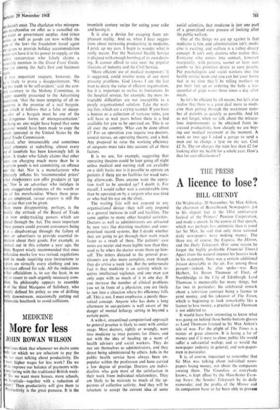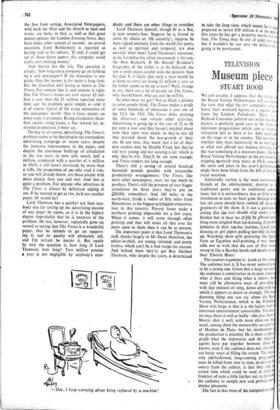A licence to lose?
THE PRESS BILL GRUNDY
On Wednesday, 20 November, Sir Max Aitken, the chairman of Beaverbrook Newspapers, gat to his elegant feet at the 141st anniversary festival of the Printers' Pension Corporation, and made a speech. In the course of that speech, which was perhaps less optimistic than is usual for Sir Max, he said that only three national daily newspapers were making money. The three are, of course, the Express, the Mirror, and the Daily Telegraph. (For some reason he forgot the highly profitable Financial Times.) Apart from the natural interest his hearers took in his statement, there was a certain additional frisson detectable in the air. For among those present—indeed, he also spoke—was Roy Herbert, 1st Baron Thomson of Fleet, of Northbridge in the City of Edinburgh. Lord Thomson is memorable for many things, but for two in particular; his celebrated remark about a television contract being a licence to print money, and his takeover of The Times, which is beginning to look remarkably like a licence to lose money, a practice Lord Thomson is not addicted to.
It would have been interesting to know what was going on behind those bottle-bottom glasses as Lord Thomson listened to Sir Max Aitken's tale of woe. For the plight of The Times is a matter of great concern. It is losing a lot of money and if it were to close, public life would suffer a substantial wallop; and so would the newspaper industry in general, and newspaper- men in particular.
It is, of course, important to remember that Sir Max was talking about individual news- papers losing money, not about the companies owning them. The Guardian, as everybody knows, is kept afloat by the Manchester Even- ing News; the Sunday Telegraph by its daily namesake; and the profits of the Mirror and its companion have so far been able to prevent
the Sun from setting. Associated Newspapers, with both the Mail and the Sketch to feed and water, are lucky in that, as well as that great money-spinner the London Evening News, they have many other sources of income : on several occasions Lord Rothermere is reported as having said to his editors, `If only I could get rid of those damn papers this company could really start making money.'
And therein lies the tale. The question is simply : how long can a company go on holding up a sick newspaper? If the Guardian is any guide, then the answer is for quite a long time. But the Guardian isn't losing as much as The Times. For rumour has it, and rumour is right, that The Times's losses are now nearer £2 mil- lion a year than the £1 million reported some time ago. Its problem quite simply is—and it is of course typical of the crazy economics of the newspaper world—that it loses money on every copy it produces. Rising circulation there- fore means rising losses, a fine reward for in- creased production, I must say.
The key is, of course, advertising. The Times's problem seems to be that despite the tremendous advertising campaign of recent years, despite the immense improvement in the paper, and despite the enormous build-up of circulation in the last years (it now sells nearly half a million, compared with a quarter of a million in 1965), it still hasn't increased, by more than a trifte, the proportion of ABS who read it (ABS. as you will already know, are those people with more money than you and me). And that is .quite a problem. For anyone who advertises in The Times is almost by definition aiming at Am. If he wanted to get at CDS, he'd use another paper. Or would he?
Lord Thomson has a quicker eye than any- body else for totting up the advertising income of any paper he opens, so it is in the highest degree improbable that he is unaware of the problem. He has, however, repeatedly gone on record as saying that The Times is a wonderful paper, that he intends to go on support- ing it, and its quality will ultimately tell, and I'm certain be means it. But surely by now the question is, how long 0 Lord Thomson, how long? Two million pounds a year is not negligible by anybody's stan- dards; and there are other things to consider.
Lord Thomson himself, though fit as a flea, is now seventy-four. Suppose he is forced to retire by illness or, Oh calamity!, suppose he were ripped untimely from the world (for peers, as well as spiritual and temporal, are also mortal); what then? Lord Thomson's successor, as his Lordship has often announced, is his son, the Hon Kenneth. If Mr Russell Braddon's biography of the father is to be believed, the son is even more careful with the pennies than his dad. Is it likely that such a man• would be as keen to carry on losing £2 million a year as his father seems to be up to now? Well, strange to say, there are a lot of people on The Times, who should know, who are sure he will be.
So what have we got? Not as black a picture as some people think. The Times makes a profit of some hundreds of thousands a year out of the TLS, the TES, The Times Atlas, printing the Observer, and various other activities. Advertising is going up at the rate of 25 to 30 per cent a year and they haven't mucked about with their rates very much, so they're not all that worried about the non-growth of their ABS. In any case, they know that a lot of their new readers may be Double Firsts, but they're still very young and not earning a lot, which is why they're cls. They'll be ABS soon enough, and Times readers for long enough.
There's still a .saving of several hundred thousand pounds possible with reasonable productivity • -arrangements; The Times, like most other newspapers, costs far too much to produce. There's still the prospect of ever bigger circulation (in three years they've put on .200,000, remember). And 180 miles to the north-west, inside a radius of fifty miles from Manchester, is the biggest population concentra- tion in this 'country. Present losses make a northern printing impossible for a few years. When it comes, it will come through offset printing and that will make all that area far more open to them than it can be at present.
The important point is that Lord Thomson's staff, thanks largely to Mr Denis Hamilton, the editor-in-chief, are young, talented, and pretty tireless, which can't be a bad recipe for success. And behind them they've got Roy Herbert Thomson, who despite his years, is determined
'—Doc, 1 keep worrying about being replaced by a machine.'
to take the long view, which means he is qui prepared to invest £10 million if at the end five years he has got a property worth £15 ni lion. The Times may be out of joint just no but I wouldn't be too sure the dislocation going to be permanent.







































 Previous page
Previous page